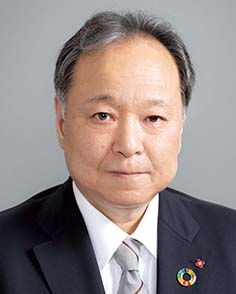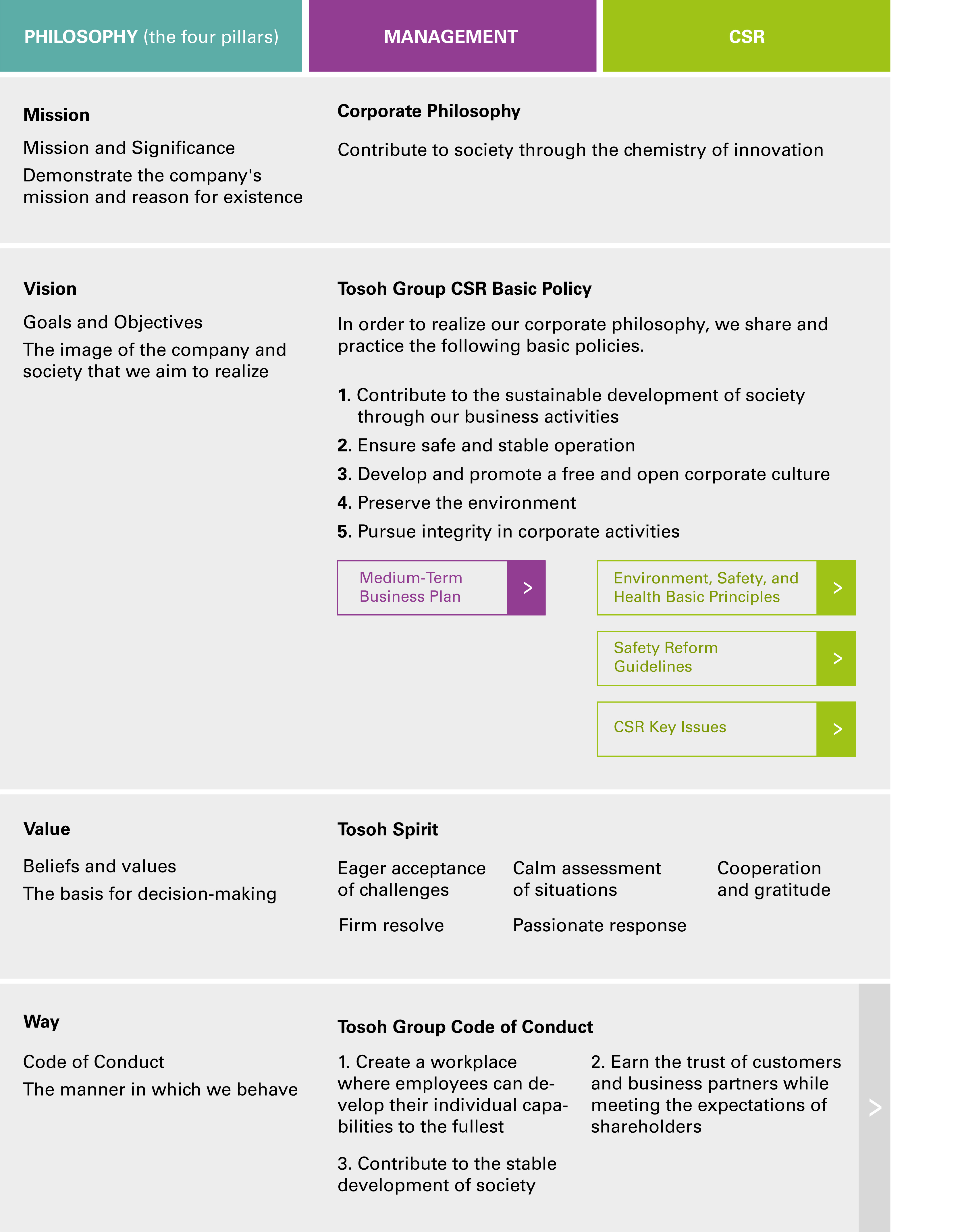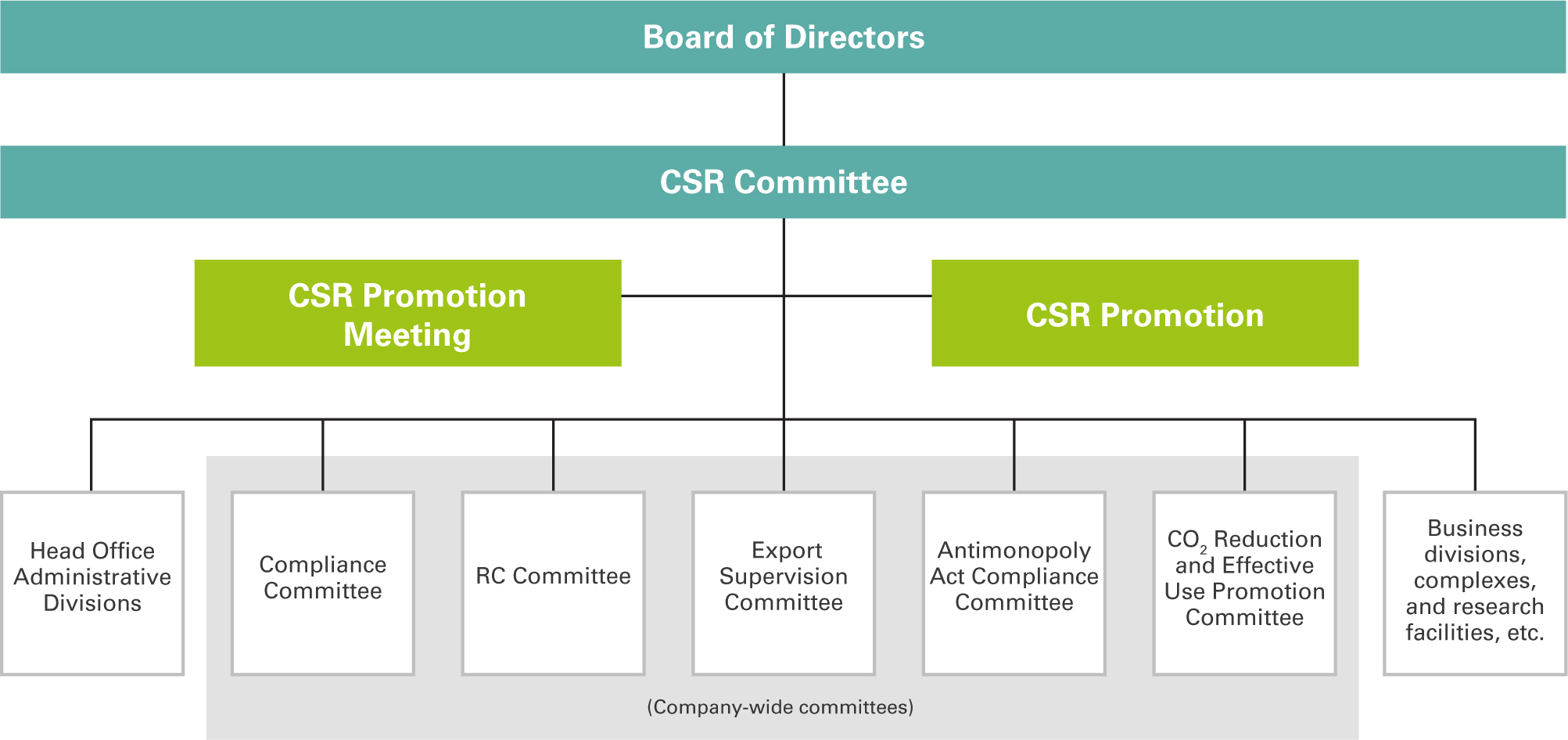Realizing our corporate philosophy of “constantly striving to contribute to society through the chemistry of innovation" is what our business and the Tosoh Group's CSR is all about.
CSR Basic Policy
The Tosoh Group positions CSR activities at the core of its management and aims to realize its corporate philosophy by sharing and implementing the CSR Basic Policy throughout the Group.
Tosoh Group CSR Basic Policy
We share and practice the following basic policies to realize our corporate philosophy.
1. Contribute to the sustainable development of society through our business activities
Through the deepening of our unique chemistry-based technologies and collaborative activities with our business partners around the world, we provide innovative and reliable products and services that help solve social issues and contribute to people's well-being.
2. Ensure safe and stable operation
We recognize that ensuring the safety and well-being of people involved in our business activities and stable operations are the most important management issues, hence we work assiduously to foster a culture that strengthens and secures our safety infrastructure.
3. Develop and promote a free and open corporate culture
By nurturing an open and people-friendly work environment that provides job satisfaction and respects human rights and diversity, we will realize a corporate culture that is full of vitality and in which employees and their families can take pride.
4. Preserve the environment
In addition to thorough management of chemical substances, we make continuous efforts throughout the value chain to minimize the impact of our worldwide business operations on the environment.
5. Pursue integrity in corporate activities
We work to maintain a global corporate group that is trusted by stakeholders through sincere and highly transparent corporate activities based on dialogue and collaboration.
Message from the head of CSR
Aiming for Sustainable Growth through Businesses that Contribute to Solving Social Issues
As stated in our corporate philosophy, the Tosoh Group aims to achieve sustainable growth through the development of businesses that contribute to solving societal issues, and to continue to be a company that is trusted by all stakeholders and necessary to society.
We consider the Sustainable Development Goals (SDGs) adopted by the United Nations as an important guideline and believe that our mission is to contribute to the realization of a sustainable society through the manufacture of products that are useful. With regard to existing products, our mission is to provide a stable supply at the level of quality demanded by our customers, and we believe that this can be achieved by ensuring a steady supply of raw materials, stable plant operations, and the safety of human resources, the company's most valuable assets.
Review Key Issues in Response to Changes in Society
Based on the CSR Basic Policy formulated in June 2018, Tosoh Group has been promoting activities toward the resolution of key CSR issues under the CSR Committee for four years. The CSR Committee and the Board of Directors review the achievement of targets and establish annual activity goals. We believe that stakeholders have a clear understanding of our activities over the past four years and these activities have certainly helped us to earn the trust of society. In fiscal 2022 we reviewed the main issues and key performance indicators (KPIs) for fiscal 2023 and beyond, as our past activities have taken root within the company and society has evolved.
We identified 21 candidate material issues that will contribute to the realization of a sustainable society and the sustainable growth of the Tosoh Group. We further conducted a quantitative materiality assessment with the cooperation of the internal promotion liaison team and external directors, as well as investment institutions and others. Furthermore, based on various opinions from investment institutions, the CSR Committee chair, and external directors, we have identified nine issues for the Tosoh Group to proactively address.
The key issues identified are the "creation and provision of products and technologies that solve societal issues," which promotes the development of technologies and products that contribute to society, and "addressing climate change issues," which solves global-scale problems, and seven other areas that serve to solidify the Tosoh Group's business foundation. We believe that these issues have been identified as essential to our contribution to the realization of a sustainable society and the sustainable growth of the Tosoh Group.
Lastly, we would like to thank once again those who provided us with their opinions concerning candidates for material issues.

Toru Doi
Director, Senior Vice President
Corporate Philosophy

CSR Promotional Structure
The CSR Committee is chaired by the president of Tosoh Corporation and is composed of members of the executive board, complex senior general managers, heads of administrative divisions, and chairpersons of the company’s other committees.
The Committee formulates CSR policies, manages the progress of work toward the key CSR goals, and reports these to the board of directors. In addition, the CSR Promotion Team has been established as a specialized department to assist the CSR Committee, organize the CSR Promotion Meeting and serve as administration for both.
In fiscal 2022, the CSR Committee met twice—in August to discuss the results of key CSR issues and KPIs for the previous fiscal year and in March to deliberate key CSR issues and KPIs for fiscal 2023–2025, which were presented to and approved by the Board of Directors in April.
CSR Promotion System
